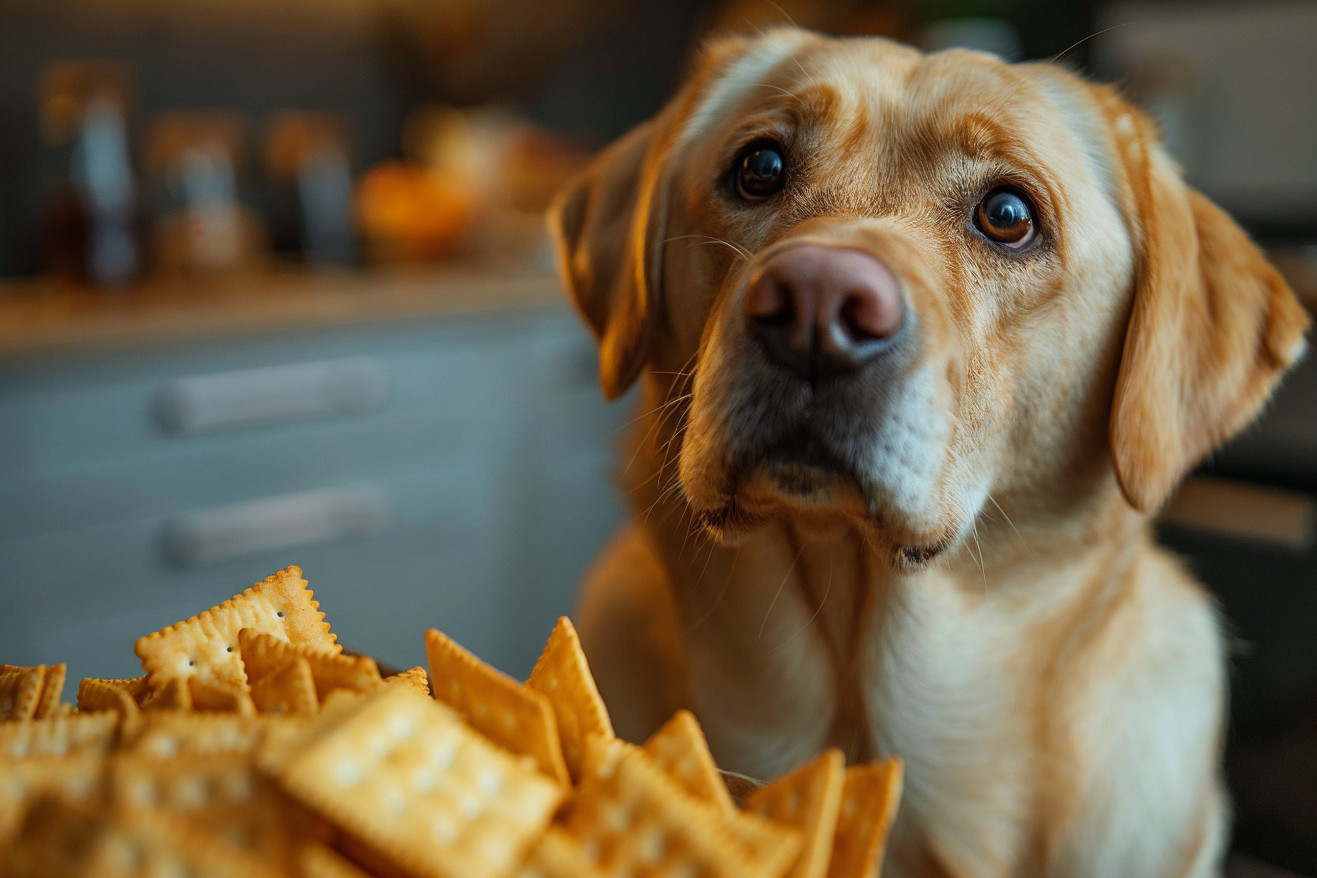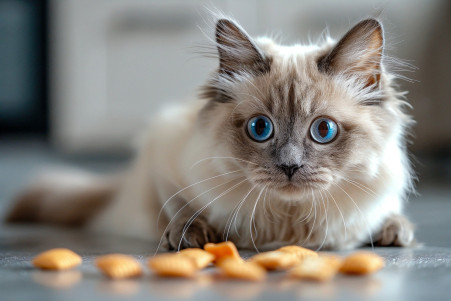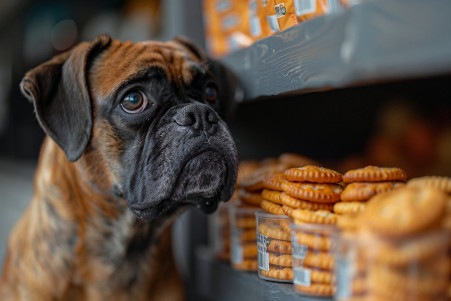Can Dogs Have Cheez-Its? Here's What a Veterinary Nutritionist Says
24 April 2024 • Updated 24 April 2024

While dogs may love the taste of cheese, Cheez-Its are a problem because of their high fat and salt content, as well as other additives that could be bad for your dog. If you want to give your dog a treat, plain crackers or a small amount of low-fat cheese are much better options than highly-processed cheese crackers like Cheez-Its, which contain artificial preservatives, too much salt, and unhealthy fats.
To make sure we provide the best advice possible, we've referenced a range of sources, including research from veterinary nutritionists and other trusted experts in the field of pet health. This in-depth research will help you better understand the potential dangers of giving Cheez-Its to dogs and learn about alternative treats that will make your dog happy without putting their health at risk. By the time you're done, you'll know exactly which foods are and aren't safe for your dog.
Can dogs eat Cheez-Its?
Risks of Feeding Cheez-Its to Dogs
There are several risks associated with feeding Cheez-Its to dogs, especially if they are eaten in large quantities. According to SpoiledHounds, dogs are especially sensitive to salt, and eating too many Cheez-Its can result in sodium ion poisoning and dehydration. As the Dogster article explains, even the standard serving size of Cheez-Its contains a lot of salt, which is not good for dogs.
The high fat and calorie content of Cheez-Its can also lead to obesity, pancreatitis, and other weight-related problems in dogs, according to DogTime. Dogs can become obese and suffer from a number of health problems if they consume too many calories from unhealthy treats.
In addition, the dairy in Cheez-Its can cause allergic reactions or digestive issues in dogs who are lactose intolerant, says SpoiledHounds. Dogs have a hard time digesting dairy.
Finally, the artificial preservatives, colors, and flavorings in Cheez-Its are not good for dogs and can negatively impact their health, according to Dogster. These additives are not needed in a dog's diet.
If a dog eats a lot of Cheez-Its, they can also displace healthier food in their diet, leading to potential nutritional deficiencies. As DogTime points out, dogs need a diet that is high in quality proteins and fats, which Cheez-Its do not provide. It's important to remember that it's best to feed dogs human food in moderation.
Symptoms of Cheez-It Allergies in Dogs
Dogs that are allergic to Cheez-Its may experience vomiting, diarrhea, and other gastrointestinal problems, according to WagWalking. Meanwhile, a question about Cheez-Its on JustAnswer explains that excessive thirst, lethargy, and dehydration can be signs of sodium ion poisoning due to the high salt content in Cheez-Its.
Dogs that are allergic to cheese or dairy may also experience skin rashes, ear infections, and respiratory issues as a result of eating Cheez-Its, according to the WagWalking article on cheese allergies in dogs. Meanwhile, a Medium article on whether dogs can eat Cheez-Its notes that weight gain, increased hunger, and decreased activity levels can be signs of overeating the high-calorie treats.
In more extreme cases, dogs may experience seizures, bronchial infections, and chronic obstructive pulmonary disease, according to the WagWalking article. It's important to pay close attention to a dog's well-being and behavior when introducing any new human foods, even in small amounts.
Healthy Snacks for Dogs That Are Safe to Eat
According to the Raleigh Vet article, dogs can eat fresh fruits like apples, bananas, watermelon, and berries to get a dose of natural sugar and vitamins. Meanwhile, dogs can eat vegetables like carrots, green beans, sweet potatoes, and broccoli to get a dose of fiber and vitamins. All of these options can be eaten raw to give dogs a satisfying crunch.
When it comes to protein, dogs can eat plain, cooked chicken, turkey, shrimp, and salmon to get a dose of lean protein, as per The Honest Kitchen. Dogs can also eat whole grains like rice and pasta, and unsalted nuts or nut butters in moderation.
The Farmer's Dog article also suggests that dog owners consider giving their pets healthy dog treats from trusted brands that are made with simple, natural ingredients instead of human snacks like Cheez-Its. These treats can offer the same benefits as the other healthy snacks on this list without the excess salt, fat, and artificial ingredients that are often found in human snacks.
By giving your dog these healthy, natural snacks, you can help them enjoy the flavors and textures they crave while also supporting their health and well-being.
How to Switch Your Dog to Healthier Treats
Introducing new treats slowly is the most important part of switching your dog from something like Cheez-Its to healthier options. According to Vets4Pets, you should initially mix a small portion of the new treat with your dog's current treats or meals. Then, over the course of 1-2 weeks, you can work up to a higher ratio of the new treat to the old one to give your dog's digestive system time to get used to it.
Keep a close eye on your dog during this time, as Earth Animal explains that a sudden change in diet can lead to an upset stomach. If you notice any signs of stomach issues, back off on the new treat and slow down the process. You can also use the new treats as positive reinforcement during training sessions to help your dog develop a taste for the healthier option, according to PetMD.
In the end, it's all about patience and sticking to the plan. As PetMD points out, it might take a while for your dog to fully accept the new, healthier treat. However, with time and a slow introduction, as well as some positive associations, you can get your dog to a place where they're eating healthier treats.
Conclusion: Make Sure You're Meeting Your Dog's Nutritional Requirements
While the occasional plain Cheez-It won't hurt your dog, it's important to make sure that you're meeting your dog's nutritional requirements. A diet that includes a good balance of high-quality proteins, fats, and essential nutrients is important for your dog's health and happiness.
By making sure that you're also giving your dog healthy, dog-safe treats, you can make sure that you're giving them what they need without sacrificing their diet. It's also important to make sure that you're only giving your dog human food or treats in moderation, even if they're safe for dogs. If you have any questions about your dog's diet or if they have any food allergies or intolerances, make sure to talk to your vet.


